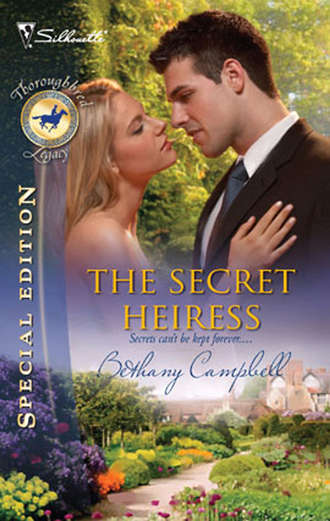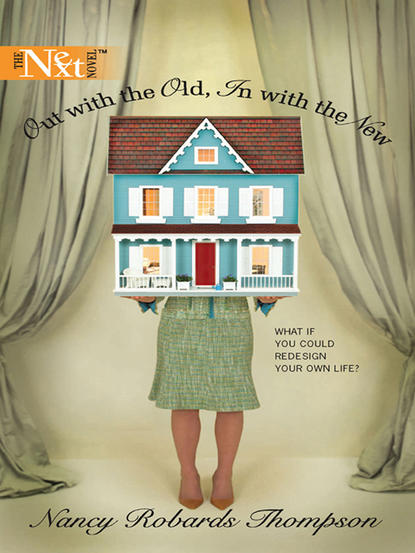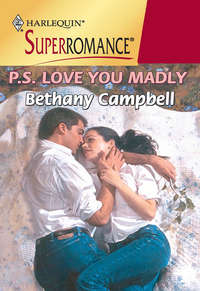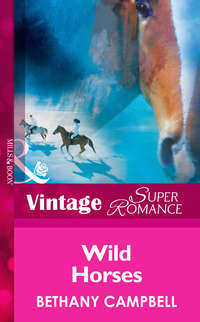
Полная версия
The Secret Heiress

Dear Reader,
Like many little girls growing up, I loved horses, though I knew I would probably never own one. So my relatives, bless them, gave me horse books!
My beloved Aunt Charlotte gave me a special book on great racehorses.
The story that most haunted me was of Black Gold, a great little horse that won the fiftieth Kentucky Derby. Run for too many years, he finished his last race—but broke a leg. He crossed the finish line on three legs—but he crossed it. And then was put down.
I thought of Black Gold when writing about Andrew, the quiet and serious hero in this book. He is a man who loves horses and is passionately devoted to both keeping the sport fair—and free of tragic endings like those that befell Black Gold, Ruffian, Barbaro and Eight Belles.
We need more like him.
Bethany Campbell
The Secret Heiress

Bethany Campbell

www.millsandboon.co.uk
BETHANY CAMPBELL
has written forty-eight novels and novellas of romance and romantic suspense. An eight-time finalist for the RITA® Award, she has won three, as well as three Reviewers’ Choice Awards, a Maggie Award and a Daphne du Maurier Award.
Under another name, she has published articles, short stories and poetry. Her proudest moments outside of romance were doing a poetry workshop with Maya Angelou, and being presented two poetry awards in one evening by Gwendolyn Brooks.
She won the 2005 Cape Fear Screen Writing Award, and her film script, Three Apples Fall, has just been shot and edited by LCW productions.
Her husband, Dan, has written science fiction, a syndicated humor column and a number of short plays and screenplays. The couple lives in northwest Arkansas with three cats and a garden that’s been out of control for fourteen years. Their favorite pastime is watching movies and videos. They plan, someday, to clean their office.
To the memory of Charlotte and Jesse Hall
and to their children, John and my dear Mary Ann
CONTENTS
PART ONE: Australia, the Northern Territory
Chapter One
Chapter Two
Chapter Three
PART TWO: Hunter Valley, New South Wales
Chapter Four
Chapter Five
Chapter Six
Chapter Seven
Chapter Eight
Chapter Nine
Chapter Ten
Chapter Eleven
PART THREE: Australia, The Hunter Valley
Chapter Twelve
Chapter Thirteen
Chapter Fourteen
PART FOUR: Australia, The Hunter Valley
Chapter Fifteen
Chapter Sixteen
Chapter Seventeen
PART FIVE: Australia, The Hunter Valley
Epilogue
PART ONE
Australia, the Northern Territory
February
Chapter One
The tall Kentuckian, Andrew Preston, was new to Australia.
And he’d come to the Northern Territory for a practical reason. He’d meant, with the help of his old friend Mick, to test the Territory’s political waters. He needed support in his run for the presidency of the International Thoroughbred Racing Federation.
At the moment, though, the political waters were icy cold.
“Listen, Yank,” the big man, Francis Bleak said. “Australian leadership should come from Oz. Reforms? We don’t need none. We’re doing fine as we are. Now I got work to do.”
The Thoroughbred breeder turned his broad back and walked into the stable. The three men who’d stood by him, listening stony-faced, cast cold glances at Andrew and silently followed Bleak inside.
Andrew looked at Mick and Mick looked at Andrew.
Straight-faced, Andrew said, “This is starting out really well, eh?”
Mick, a breeder himself, ruddy and red-haired, shrugged. “You told me to introduce you to some tough ones. I just did. It could have been worse. He could have shot you.” Mick started toward his Jeep.
“Be quiet,” Andrew cautioned. “We’re not out of range yet. I take it he’ll vote for Bullock.”
“Righto,” Mick said with a nod. “But I warned you about Bleak. Hey, I’ve known him all my life. He may raise horses, but he’s an ass.”
Mick and Andrew, both thirty-five, had once been roommates in grad school in Kentucky. Mick, squarely built and freckled, had returned to Australia, where he now was president of the Northern Territory Thoroughbred Association.
In Kentucky, Andrew had served two terms as executive director of the Thoroughbred Association of the Americas, Southern Region. He was a tall, lean and broad-shouldered man. His dark hair was thick and wavy, his features finely carved. For generations, his family had bred and raced Thoroughbreds, and he moved with an expert horseman’s physical confidence.
He loved the sport, but he had serious concerns about it. Serious enough to make him take action. When he’d been asked to run for the presidency of the International Thoroughbred Racing Federation, ITRF, he’d taken it as a great honor. But an even greater responsibility.
When he spoke of reforms, he meant reforms. Reforms in breeding, equine safety—and the ugly inroads crime had made into the sport. There were people, powerful people, who didn’t like his ideas, especially about cleaning out the criminal element.
Mick had kept company with him this week to personally introduce Andrew to the racing set in the Northern Territory. He believed passionately in Andrew’s cause and wanted it clear that Andrew had solid connections to Australia—both family and friends.
Both men knew that Andrew faced a grueling fight against Aussie candidate Jackson Bullock. Australia was the deciding contest. There would be other elections the same day in smaller Pacific countries, but Australia was where the presidency would be won or lost. Bullock was the favorite here, a native son with longtime ties to the racing community.
Andrew’s dark brows drew together. “Bullock’s going all out to beat me?”
Mick’s good-natured face clouded. “Right. He didn’t expect you’d get so much support in Europe. He thought he’d win easy, and now he’s pissed off. Here, he means to dominate you. On his airwaves. In his papers. Through all his media connections. He’ll fight hard. And if he has to, he’ll fight dirty.”
A deep voice called from behind them. “Misters—can I speak with you?”
Andrew glanced over his shoulder and saw a dark-skinned man dressed in jeans, a bush shirt and cowboy hat. He was a burly fellow and carried a blacksmith’s anvil as if it weighed but a few pounds. Mick stopped, and so did Andrew.
“Raddy.” Mick grinned, “I didn’t see you.”
“I was just inside the stable,” the man said with a laugh. “I came to borrow Barney’s small anvil.” He tucked the anvil under one brawny arm.
“Andrew, this is Conrad Nakumurrah, best blacksmith in the shire. Raddy, this is my Yank friend, Andrew Preston. He’s running for prez for the ITRF.”
“Pleased to meet,” said Raddy. He shook Andrew’s hand with a grip appropriately like iron. Andrew feared for his finger bones.
“Same here,” he managed to say.
“I heard what you said to Bleak,” Raddy told him. “I like what I heard. You have sympathy for horses. That’s good. You going to my boss’s place?”
“Dead cert,” Mick answered. He started walking again, and the other two men fell in step on either side of him.
“My pickup’s parked by your Jeep,” Raddy said. He looked up at Andrew shrewdly. “I heard the way you talk about the animals. Some people—” he nodded back toward Bleak’s stable “—they don’t care for the horses. Only the money. Breed ’em for the long legs until the long legs break. And so forth. You are against such things, right?”
“Right,” Andrew replied with a sideways smile.
Raddy cocked his head and narrowed his eyes. “You know about the Song Lines? The Dreaming Tracks?”
“Only a little,” said Andrew. “I read a book about it.”
“Ha! I hear you talk, I suspect you understand. Australia is part of a song the earth sings. Part of the dream the earth dreams.”
Andrew smiled and nodded. “Yes. So is Kentucky. Where I come from.”
“Ha!” Raddy exclaimed again. He turned to Mick and pointed at Andrew. “This is a good fellow, yes?”
“Yes,” Mick agreed. “He is. But tell me, Raddy, how’s your family.”
“I have a new child. A beautiful boy child. It is odd you ask about my family.”
“Why?” asked Mick.
“Because last night, my wife had a feeling that today something special would happen. She made a charm. ‘Someone will need this,’ she said. ‘You’ll know him when you see him,’ she said. Aha!” Again he pointed at Andrew.
Andrew blinked in surprise. Mick gave Raddy a dubious look. “I can never tell about you. If you believe this stuff or if you’re pulling my leg.”
“Maybe I’m doing both at once,” said Raddy, flashing a smile. But he reached into the back pocket of his jeans and pulled out a wooden charm. It was a beautifully carved bird with a beak painted yellow, its body black and white and red. It hung on a necklace of red string.
“Here,” Raddy said, handing Andrew the charm. “Wear this. It will bring you something important. My wife knows these things.”
“It’s—wonderful,” murmured Andrew, touched, yet puzzled. “What is it?”
“Put it on, put it on. It will bring change to your life. Because you know the earth sings songs, it dreams dreams.”
Andrew put the string with the charm about his neck, feeling odd. Did he have the right to do this? But Raddy only smiled more broadly. He swung the anvil into the back of the truck, opened the door and got in. “I will see you later?”
Mick nodded. Raddy grinned. “Catch you then!” He backed up, changed gears, and drove off.
Andrew and Mick got into the Jeep. Andrew looked skeptically at the carved charm hanging from his neck. “What’s it mean?”
“I don’t know.” He glanced at Andrew. “Do you believe all that rigmarole? Song lines and charms and stuff?”
Andrew shrugged. “What do you think of it? You understand it better than I do.”
“I’m never sure. Sometimes I think the Aborigines see things we don’t see. They know things we don’t know. I’d treat that charm with respect, if I were you.”
Andrew fingered it uneasily, then dropped it inside his blue shirt. Beneath the painted wood, his heart tingled strangely.
At that same moment in the Northern Territory, in the city of Darwin, Marie Lafayette had finished her day’s classes at the university and fought the unusually heavy traffic.
She weaved and darted on her secondhand bike, moving with surprising speed for one so small. She was barely five foot two, hardly more than a hundred pounds, and although she was petite, her body was toned and muscular.
Legs pumping, she headed for the Royal Darwin Hospital where her mother lay in the critical care unit. A heart attack had felled Colette Lafayette, her third—and worst—attack in as many years.
Although it was February and still “the Wet,” the rainy season, today the sun shone, and the clouds were distant. But Marie knew better than to trust the Northern Territory’s fickle weather. She had a secondhand rain poncho in her secondhand backpack.
In the hospital parking lot, she chained her bike to a rack, and headed for the main entrance. The building, one of the tallest in Darwin, was a miracle of engineering, designed to withstand the cyclones that were the curse of the city.
Marie made her way to the elevator, pulling off her helmet and shaking her head. Her hair was thick and golden, and she trimmed it herself into a short, smooth bob. Her eyes were her most arresting feature; they were long-lashed and a pure crystalline light green, unmarked by even a touch of hazel.
Her high cheekbones, straight little nose and full lips gave her a delicate femininity in spite of her boxy unisex clothes. She wore the university uniform for cookery classes, a white shirt and plain black trousers.
She got off at the critical care facility. She no longer had to identify herself at the desk. The entire staff recognized her by now. She headed down the hall and quietly opened Colette’s door.
Colette lay with her eyes closed, and Marie’s heart tightened in alarm. Her mother looked even frailer than she had yesterday. But her eyes immediately fluttered open, as if she sensed that Marie was there.
“My good girl,” she said in a small voice.
Marie caught Colette’s hand in her own, as if she could pump some of her own strength and energy into her mother. “Mama,” she said softly and bent to kiss her.
Colette smiled and stared up at her. “My good girl,” she repeated. “This is a school day. Isn’t it? How were classes?”
“Good, Mama. And my job at the Scepter’s going well. Last night they told me they wanted to train me for management when I finish this round of certification.”
Marie worked evenings waiting tables at the restaurant in the Scepter Hotel and Resort, one of Darwin’s finest. The manager considered himself a perfectionist, but he’d said Marie had exceeded even his expectations.
Now the older woman sighed and smiled. “Ah. You’re so smart, and you work so hard.”
“Mama, let me bring you something homemade tomorrow. You’re getting too thin. You’re not used to hospital food.”
Colette grimaced. “I have no appetite. Eating tires me.”
Marie squeezed her hand more tightly. “Home cooking will make you feel better.”
Colette shook her head. “What makes me feel best is how well you do. You’ve got an education, opportunity, prospects. That’s what’s important. You’ll have a good future—secure.”
Marie swallowed. Education, opportunity, prospects, security. These were things her mother had never had. But she’d worked unstintingly for Marie, and now it was Marie’s turn to care for Colette. And she would—she was prepared to drop out of school for a semester, even take a leave of absence from her job if she had to.
“I’m doing fine, Mama. And you’re going to be fine.”
Colette’s mood shifted strangely. “I’ve been thinking. I have something to tell you. Something I’ve held back. You know about Reynard and me.”
Marie nodded, but was concerned: Colette had been repeating herself lately—was this a bad sign? She kept talking about the past as if she were struggling to make it clearer to Marie, although Marie knew it well.
Reynard was Colette’s brother by law, but not by birth. The Lafayettes had first adopted Colette, then four years later, Reynard. But the family had almost been ruined by the 1950 cyclone. The cyclone, unnamed, destroyed the little building where the Lafayettes lived above their pastry shop—everything they had.
Colette’s father, overwhelmed by depression, never recovered. The family began a spiral into near poverty. Neither Colette nor Reynard could finish their schooling.
“I told you I never knew who my birth mother was,” Colette murmured.
Marie nodded; she knew that part of the story by heart. But then Colette surprised her. “But maybe I do know. I didn’t know how to tell you. I started writing to people. A nurse in Queensland answered me—two years ago. This is her letter. Remember that little wooden box I asked you to bring? The letter was in it. But don’t read it here. Read it at home and think about it. Yes, it’s time I put it in your hands. I feel it.”
It was time? She felt it. What did Colette mean? Marie fought down a wave of alarm. She forced a smile, as cheery as she could make it. “You’re being very mysterious.”
With an unsteady hand, Colette picked up an envelope from the bedside stand. “I didn’t know what to believe, what to do, so I did nothing. I just have no idea…”
Colette seemed exhausted. “So I’m passing it on to you. To find out or—I’m so tired,” she said. “I’m sorry. You’ve come all this way, but I think I’m going to fall asleep. It’s all I do lately.”
“Don’t apologize. You need rest. Sweet dreams.” Marie bent and kissed her mother’s cheek again. Already Colette’s eyelids were lowering, but she managed a smile.
Marie studied the envelope, feeling an indefinable uneasiness, and then tucked it into her backpack. She stared at Colette’s face, once smooth and delicate, but now shadowed by illness.
Making her way to the elevators, Marie punched the down button, her stomach queasy with anxiety. She and Colette were not only mother and daughter, but the closest of friends. Colette had to recover. She had to. Life would be empty and loveless without her.
The elevator doors slid open, and Marie blinked in surprise. A cupid, a very tall, chubby cupid, stood inside. At first glance he seemed naked except for a large white diaper and two inadequate wings sprouting from his back. Cupid’s blue eyes widened, and he gave Marie a smile and a leer.
She quickly realized he wasn’t naked, but dressed in flesh tights and a leotard.
A gilded bow hung from one shoulder. Slung over the other was a little gold quiver of darts with pink heart-shaped tips. His mop of curly blond hair was clearly a wig.
“Hello, Dearie,” he said, looking her up and down. “Happy Valentine’s Day.”
“It’s a bit early for Valentine’s Day,” Marie returned, hardly in a mood for silliness. She noticed he carried two large pink tote bags, each labeled BNC for Bullock News Corporation and showing a jolly, smiling caricature of its founder, Jackson Bullock.
Cupid jiggled one of the bags, which seemed to be empty. “BNC’s sending me to children’s wards to hand out goodies—candies and crackers and balloons.”
“Very admirable,” Marie said between clamped teeth.
“I got a lovely Scallywag biscuit left. Want it?”
“No, thank you,” she said in the same tone.
“Aww,” he said. “Troubled? You look worried. Shame, a pretty thing like you. You need Dan Cupid in your life. All of him you can get. How about a spot of supper tonight?”
She looked at him as if he were a bug. She rolled her eyes and muttered, “Puh-leese.”
“Please pick you up? With pleasure. What time? Where do you live? Do you like the Pizza Shack?”
She flashed him a disgusted glare. “Thanks, but no thanks. I’m not in the mood. Please just leave me alone.”
“Oh, ho!” he said in a hostile tone. “Aren’t you little Miss Snip? What’s the matter? Don’t you like men?”
She was saved by the door opening into the lobby. She was smaller than he was, but trimmer and faster. She sprinted toward the hospital’s main entrance.
“Hey!” he bellowed. “You shouldn’t run off from Dan Cupid. You’ll be sorry.”
She dashed out the door and toward the bike racks. She glanced over her shoulder in case he was following her, but she could see no trace of him. Thank God, she thought. Could life get any more surreal?
She was sick with forebodings about her mother, and now she’d been harassed by an overweight man in a diaper. Things could not get worse.
Seven seconds later, just as she reached her bike, a flash of lightning nearly blinded her, and a thunderclap almost broke her eardrums. The sky was no longer blue but roiling with storm clouds. She felt the first drops of rain.
A strong, wet wind sprang up, almost flattening the hospital’s flower garden, and the rain began to cascade in earnest. She slipped out of her backpack, got out her heavy weather rain cape, shook it out and started to put it on.
Another gale of wind made her stagger, and it ripped the cape from her hands and sent it flying off like a strange yellow bat over the storm-tossed shrubs. It flapped as high as the trees and disappeared. The whipping rain half blinded her.
She’d have to walk the bike home, as fast as she could. She swore softly, then gritted her teeth and told herself to buck up. She needed to be at her job within three hours.
Marie felt like the proverbial drowned rat when she reached the apartment that she and Colette shared. Curious as she was, she knew there wasn’t time to read the mysterious letter. She laid it atop her dresser, showered and got ready for work.
She put on a plain black skirt and another white shirt, this one with frills and clip-on black bowtie. She studied herself in the mirror and thought that her life was a series of changing uniforms. Even when not in a work uniform, she had a sort of uniform. Bush pants and shirt—sturdy and sensible wear.
Now she fluffed her hair to make it look softer and gave thanks that she had a ride to the Scepter Hotel. Her coworker, Izzy, would pick her up and bring her home. Marie chipped in for petrol and Izzy’s trouble.
When Isabella honked, Marie snatched up her raincoat and dashed for the car. She made small talk with Izzy, but didn’t confess her fear that Colette seemed worse. She couldn’t bring herself to put her anxiety into spoken words. She feigned her usual natural cheer.
That night, distracted as she was, she performed her job with utter professionalism, perfect courtesy and genuine charm, as if she hadn’t a care in the world. She spoke Chinese to the Chinese businessmen, Malaysian to the Malay tourists, and Spanish to a traveler from Argentina. She had a gift for languages and had studied them at college. She had a smile for everyone.
Well, almost everyone. Butch Paul, a busboy, had come close to sexually harassing her lately, but if he tried tonight, he’d be extremely sorry.
When other men tried to flirt with her, she acted as if they were only teasing and smiled at them, refusing to get involved. Nobody came to the Scepter to be greeted by a mope. Her business was not hanging her heart on her sleeve, it was hospitality.
Redheaded Mick Makem was a regular customer, and tonight when he joked with her, she made herself banter back as if she were in the best of spirits.
She vaguely noticed that he sat with a dark, lean man who was strikingly handsome, then rebuked herself for paying attention to a good-looking man at a time like this. She’d vowed to keep herself under strict control tonight.
But then it happened. Butch the busboy gave the side of her breast a hard squeeze as she was leaving the kitchen, and she snapped. She spun about and stamped his foot so hard that tears sprang into his eyes. “That’s not fair,” Butch accused. “You know kung fu or something.”
“Yes, I do,” Marie returned coolly. “So don’t ever touch me again. Ever.” She turned and left him glaring after her. She hadn’t spilled so much as a drop from the drinks on her tray.
“Somebody ought to take you down a notch,” Butch sneered.
Marie saw that Mick and his dark-haired friend had seen it all. Mick made an okay sign and grinned at her as she came to their table. “Way to go, slugger,” he said.
The dark man simply stared at her with a strange intensity. He said, “We both saw what he did. Do you want us to report it? He was completely out of line.”
He looked genuinely concerned, but she said, “No thanks. I’ll be fine.”
“You’re sure?” he asked, looking into her eyes.
“Positive,” she said. And she was positive. She had a green belt in karate, and someday she intended to work her way up to black. Colette had insisted she take classes. Darwin had its rough elements, and Marie was so small that Colette wanted her to know how to protect herself.
But physical toughness wasn’t going to get her through this latest crisis. Colette’s illness demanded a different kind of strength, and she wasn’t sure how much she had left.
And as the work night wore on, she wondered more and more about the contents of Colette’s mysterious envelope. Why’d she give it to me now? What did she mean, it’s time?










